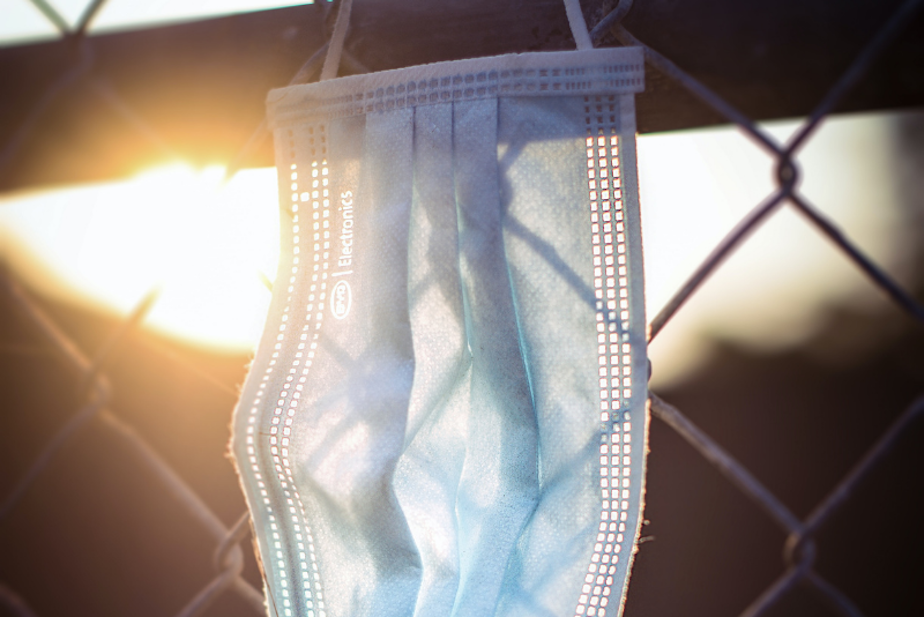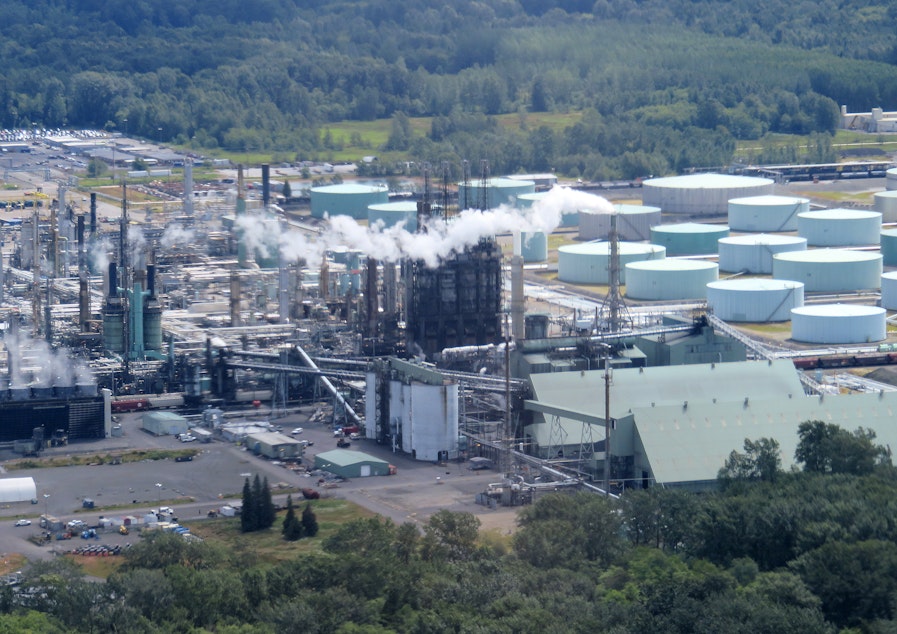Pandemic conditions are changing again. Let's talk: Today So Far

Pandemic conditions are changing again, prompting Washington state to start easing up on some restrictions. Maybe it's time for another talk as we move forward into yet another "new normal."
This post originally appeared in KUOW's Today So Far newsletter for Feb. 10, 2022.
It's time for another talk. You know, the same talk we all had when vaccines started coming out. And also when Covid cases dropped last summer. Every time we make progress, we all consider how to open our lives back up. It seems now is that time yet again.
The first indication of this is the end of the outdoor mask mandate (not sure if that is even much of a thing these days) on Feb. 18. We could know by next week when Washington's indoor mask mandate will end. Gov. Jay Inslee is also pulling back National Guard members who were recently deployed to help overwhelmed hospitals. And a conversation has already started about nixing masks in K-12 schools.
This makes Washington the latest state to start easing up on pandemic mandates after the most severe Covid wave ever in this pandemic. I should note that Covid cases and hospitalizations are still very, very high in Washington. Though the numbers are declining at a rate that prompted Gov. Inslee to say yesterday: “We believe this wave has gone up like a rocket. It’s going to come down like a rock."
I can't recall any time during this pandemic when anyone, let alone the governor, was willing to make such a bold prediction. It would be in line with other parts of the world that experienced an omicron wave. Local experts are looking ahead to March for when things are estimated to settle down. So folks are optimistic, but I want to throw out one final thought. It seems every time we have made progress during this pandemic, we also encounter a significant setback. We experienced a miracle with Covid vaccines, and then a bunch of people wouldn't take the shot because they thought Bill Gates might put a microchip in them. When vaccines and precautions eventually worked, bringing cases down, the coronavirus came back and said: "Oh, yeah, well here's delta ... oh, you think you're good with that? Well, wait 'til you get a load of my little friend omicron!" So while we can start thinking about our next steps, let's keep in mind a few cautious lessons we have learned.
Let's look to Edmonds for how such next-step conversations are starting to emerge. Remember those streateries that popped up during the pandemic? They showed up all over the state as a means of providing a safe, outdoor eating environment for struggling restaurants. They often extend an eating area onto a sidewalk, or a parking space in front of the business. A lot of people ended up liking them, myself included. But in Edmonds, there is a conflict between restaurants that want them to stay, and city officials who want to make a buck. After getting the streaterie program started, Edmonds decided to start charging businesses $4,000 for a four-month permit. After some pushback, that was lowered to $2,000. Because why not start charging new fees for financially-struggling businesses amid a crippling pandemic? (sarcasm)
Sponsored
The permit fees add up to some shops with the ability to pay having an edge over those that aren't as flush with cash. That brings up an equity issue. The other side of the argument in Edmonds is that some locals don't like the way they look. And understandably, they take up scarce parking spots. Overall, the issue is prompting the question of whether or not to keep up advancements from pandemic times, or move on. Hear this full story on Seattle Now.
Have a comment or want to reach out to me? Send me an email at dyer@kuow.org.
AS SEEN ON KUOW

The BP Cherry Point refinery is among a small handful of sites that produce gasoline and diesel for the Northwest region. Washington state's Democrats have a new proposal to tax the gas coming from these refiners, but not for Washingtonians. The tax would only be on gas exported to Alaska, Idaho, and Oregon. (Northwest News Network)
Sponsored
DID YOU KNOW?
Let's talk about George Bush. Not that guy. The George Bush who founded Tumwater, Wash. in the 1800s. Tumwater was the first major settlement in the Puget Sound area. It became a major hub for travelers and Indigenous peoples, all of whom highly regarded this man and his family. It is the earliest site where Americans settled in what would become Washington state. And it was founded by an African American.
Bush was of Irish-African descent and born in the late 1700s in Pennsylvania. He became a successful free man decades before the Civil War ended slavery in the U.S. He moved around in his early life, making money from cattle, fur trapping, and being a soldier. Though, being a person of color, he often found that laws and communities were not welcoming to him, especially as a free man with money in Missouri, where slavery was legal.
So with his friends, the Simmons family, he traveled to the Oregon territory in 1844. Unfortunately, discriminatory laws were established in Oregon by the time they arrived. People of color were not allowed south of the Columbia River. So they headed north where the territory was jointly run by the U.S. and the British Empire, and founded Bush Prairie, a highly successful farm. He also financed a sawmill and a gristmill, and started a hotel that was open to everyone. As Washington eventually started to take shape, more exclusionary laws emerged, banning people of color from owning land. But Bush's reputation was so favorable, the territory's early lawmakers petitioned Congress to make an exception for him. Congress passed a special act, and Bush became the first person of color to own land in the state. The exclusionary laws remained on the books for everyone else, however.
Tumwater remained a beacon for travelers and indigenous peoples for decades. And signs of Bush's influence remain today. His son William became a state lawmaker, and introduced the bill that established Washington State University. Bush also planted a butternut tree in Tumwater that is still there. A seedling from that tree was planted on the state capitol grounds in Olympia in 2009 and was dedicated to Dr. Martin Luther King Jr.
Sponsored
ALSO ON OUR MINDS

1 in 5 Patriot Front applicants say they have ties to the military
About one in five applicants to group Patriot Front claim to have current or former military status. The white supremacist group published 87 applications to Patriot Front on an open-source chat platform. Out of those applications, 18 said they were current or former members of the U.S. military. One applicant said he currently worked for the Department of Homeland Security.

